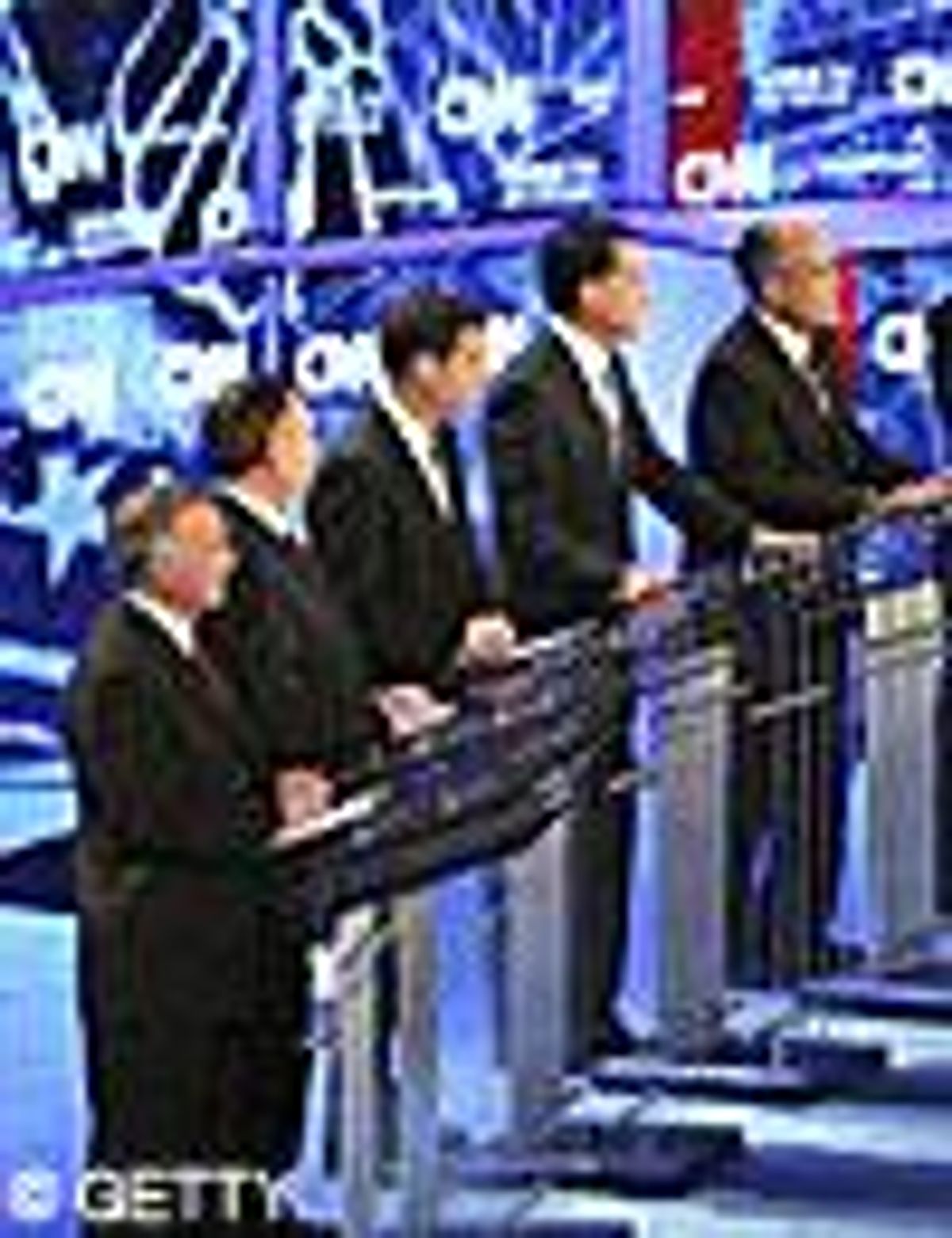President Bush
drew sporadic, startling criticism Tuesday night in
Manchester, N.H., from Republican White House hopefuls
unhappy with his handling of the Iraq war, his
diplomatic style, and his approach to immigration.
''I would
certainly not send him to the United Nations'' to represent
the United States, said Tommy Thompson, the former
Wisconsin governor and onetime member of Bush's
cabinet, midway through a spirited campaign debate.
Arizona senator
John McCain criticized the Administration for its
handling of the Iraq war, and former Massachusetts governor
Mitt Romney said, ''I think we were underprepared and
under-planned for what came after we knocked down
Saddam Hussein.''
Rep. Duncan
Hunter of California said the current administration ''has
the slows'' when it comes to building a security fence along
the border with Mexico.
Rep. Tom Tancredo
of Colorado recalled that White House aide Karl Rove
had once told him ''never darken the door of the White
House.'' The congressman said he'd tell George W. Bush
the same thing.
Their criticism
of Bush was the type of rhetoric that is
more expected when Democratic presidential contenders
debate.
Its prominence at
the GOP event--while Bush was traveling
overseas--was a reflection of his poor poll
ratings and the need even for members of his own
party to campaign on platforms of change.
The Republicans
sprinkled the criticism of Bush throughout a two-hour
debate that ranged over topics from war to immigration
legislation pending in Congress to religion. The
debate was the third of the accelerated primary
campaign.
None of the 10
men on the debate stage raised his hand in agreement when
moderator Wolf Blitzer of CNN asked if anyone favored
allowing gays to serve openly in the military.
Sen. Sam
Brownback of Kansas and Hunter both said they would pardon
Vice President Dick Cheney's former aide Lewis I.
''Scooter'' Libby, sentenced to 30 months in prison
earlier in the day for lying and obstructing a CIA
leak investigation.
Former New York
City mayor Rudy Giuliani, a former prosecutor, said the
sentence was excessive, which ''argues in favor of a
pardon.''
Giuliani had the
central role in an unscripted moment of humor.
Asked about a
Rhode Island Catholic bishop who criticized him for
supporting abortion rights, Giuliani had just begun to
respond when a lightning strike briefly interfered
with the debate hall sound system.
''Look, for
someone who went to parochial schools all his life, this is
a very frightening thing that's happening right now,''
he said to laughter.
The debate drew
the announced Republican presidential contenders--but
not former senator Fred Thompson of Tennessee, an
actor apparently poised to join the race in a month's
time.
''My name is
Thompson. I'm the candidate, not the actor,'' said Tommy
Thompson in a jab at the man who wasn't there.
Fred Thompson,
appearing on Fox News after the debate, said he had
watched part of the give-and-take among his potential
rivals. ''They did all right, from what I saw,'' he
said.
Much of the
debate focused on Iraq.
McCain and
Brownback both admitted they voted to authorize the U.S.
military invasion of Iraq without reading the formal, nearly
90-page National Intelligence Estimate in advance.
The confession
drew a jab from former governor Jim Gilmore of Virginia.
Members of Congress ''ought to read at least that kind of
material,'' he said.
Hunter said he
had, the only member of Congress on the debate stage to
make the claim.
Both McCain and
Brownback said they had received numerous briefings on
the situation in Iraq before they cast their votes in 2002.
National
intelligence estimates are compilations of the best thinking
of U.S. intelligence agencies, meant to provide the
broadest guidance to government policymakers.
But they can be
wrong. A 2002 assessment, for example, concluded that
Iraq had continued its development of weapons of mass
destruction, held arsenals of chemical and biological
weapons, and ''probably will have a nuclear weapon
during this decade.''
McCain drew loud
applause from the partisan debate audience when he
turned a question about the war in Iraq into criticism of
the leading Democratic presidential hopeful, Sen.
Hillary Rodham Clinton of New York.
''When Senator
Clinton says this is Mr. Bush's war, President Bush's
war,'' she is wrong, he said. ''When President Clinton was
in power, I didn't say Bosnia was President Clinton's
war,'' the Arizona senator said.
''Presidents
don't lose wars. Political parties don't lose wars. Nations
lose wars,'' he added.
The criticism of
Clinton and the Democrats was standard campaign fare for
Republican candidates, and as they have before, the GOP
hopefuls lavished praise on the late Ronald Reagan.
McCain has long
criticized Bush for fumbling the aftermath of Saddam's
fall, and Romney has recently begun to make some of the same
criticisms.
Former Arkansas
governor Mike Huckabee added his voice to those
criticizing the war effort. He added that the Bush
administration ''lost credibility'' with its response
to Hurricane Katrina in 2005.
Thompson's words
were perhaps the most startling, coming from a man
who had once served in the president's cabinet as secretary
of the Department of Health and Human Services.
Bush's decision
to invade Iraq caused hard feelings with longtime allies
in Europe, and elsewhere around the world.
Bush's support
for the pending immigration legislation is the source of
Tancredo's criticism, and the issue figured prominently in
the debate.
McCain, alone
among the contenders on the St. Anselm College debate
stage, supports the measure, and he sought to fend off
criticism from some of his rivals.
''We cannot have
12 million people washing around America illegally, my
friends,'' he said.
But Giuliani said
the legislation was flawed, ''a typical Washington
mess.'' (Glen Johnson, AP)














































































